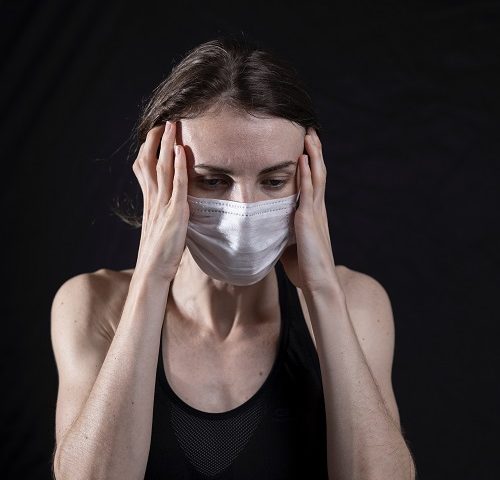ANSO-CR-PP-2021-10
Project Duration:
2022-2024
Principal Investigator:
Anna Alexandrova-Karamanova
Department of Psychology, Institute for Population and Human Studies, Bulgarian Academy of Sciences
Collaborators:
Peter Halama, Centre of Social and Psychological Sciences - Slovak Academy of Sciences
Anita Lauri Korajlija, Department of Psychology, Faculty of Humanities and Social Sciences, University of Zagreb, Croatia
Adriana Baban, Department of Psychology, Babes-Bolyai University, Cluj-Napoca, Romania
Branislav Uhrecký, Centre of Social and Psychological Sciences - Slovak Academy of Sciences
Janka Tencerová, Centre of Social and Psychological Sciences - Slovak Academy of Sciences
Summary of the project:
Post-COVID-19 syndrome is a condition characterized by long-term symptoms and complications that continue or develop after acute COVID-19. It has been found the majority (up to 80%) of patients admitted to hospital with severe COVID-19 disease experience long-term physical and psychological symptoms. The study aims to qualitatively explore the experiences of severe or critical COVID-19 adult survivors throughout the post-acute period (within 1 year post hospital discharge) in four Eastern and Central European countries: Bulgaria, Slovakia, Croatia, and Romania. It will examine both negative (physical and mental health symptoms, cognitive symptoms, post-traumatic stress, difficulties in social functioning, diminished functional ability, etc.) and positive (post-traumatic growth) long-term post-COVID effects and will assess the role of survivors’ personal (e.g., self-efficacy, resilience, hope, optimism), social (e.g., social support) and other (e.g., financial) coping resources in the recovery period. A biopsychosocial public health perspective is adopted. Participants include 128 adult severe or critical COVID-19 survivors (32 participants per country) of all ages, with varying length of the post-acute period (up to 1 month, 1-3 months, 3-6 months, and 6+ months post discharge). The study will collect data through in-depth semi-structured interviews and analyze them through thematic analysis (Braun & Clarke, 2006). Survivors’ experiences will be studied as embedded in the local sociocultural context and the local epidemic-related situations in the participating countries. To our knowledge this will be the first study to qualitatively examine and cross-nationally compare the experiences of severe or critical COVID-19 survivors throughout the post-acute period. It will study lived experience of severe or critical COVID-19 survivors from a region of Europe that is insufficiently explored. Knowing patients’ experiences enables better understanding of their needs for support and will allow for the development of socioculturally appropriate tailored approaches to the treatment of post-COVID-19 syndrome and psychosocial support in the recovery process.
Key words:
Severe or critical COVID-19 survivors, post-COVID-19 long-term health effects, post-COVID-19 long-term psychosocial effects, post-traumatic growth, coping resources, qualitative research
2022-2024
Principal Investigator:
Anna Alexandrova-Karamanova
Department of Psychology, Institute for Population and Human Studies, Bulgarian Academy of Sciences
Collaborators:
Peter Halama, Centre of Social and Psychological Sciences - Slovak Academy of Sciences
Anita Lauri Korajlija, Department of Psychology, Faculty of Humanities and Social Sciences, University of Zagreb, Croatia
Adriana Baban, Department of Psychology, Babes-Bolyai University, Cluj-Napoca, Romania
Branislav Uhrecký, Centre of Social and Psychological Sciences - Slovak Academy of Sciences
Janka Tencerová, Centre of Social and Psychological Sciences - Slovak Academy of Sciences
Summary of the project:
Post-COVID-19 syndrome is a condition characterized by long-term symptoms and complications that continue or develop after acute COVID-19. It has been found the majority (up to 80%) of patients admitted to hospital with severe COVID-19 disease experience long-term physical and psychological symptoms. The study aims to qualitatively explore the experiences of severe or critical COVID-19 adult survivors throughout the post-acute period (within 1 year post hospital discharge) in four Eastern and Central European countries: Bulgaria, Slovakia, Croatia, and Romania. It will examine both negative (physical and mental health symptoms, cognitive symptoms, post-traumatic stress, difficulties in social functioning, diminished functional ability, etc.) and positive (post-traumatic growth) long-term post-COVID effects and will assess the role of survivors’ personal (e.g., self-efficacy, resilience, hope, optimism), social (e.g., social support) and other (e.g., financial) coping resources in the recovery period. A biopsychosocial public health perspective is adopted. Participants include 128 adult severe or critical COVID-19 survivors (32 participants per country) of all ages, with varying length of the post-acute period (up to 1 month, 1-3 months, 3-6 months, and 6+ months post discharge). The study will collect data through in-depth semi-structured interviews and analyze them through thematic analysis (Braun & Clarke, 2006). Survivors’ experiences will be studied as embedded in the local sociocultural context and the local epidemic-related situations in the participating countries. To our knowledge this will be the first study to qualitatively examine and cross-nationally compare the experiences of severe or critical COVID-19 survivors throughout the post-acute period. It will study lived experience of severe or critical COVID-19 survivors from a region of Europe that is insufficiently explored. Knowing patients’ experiences enables better understanding of their needs for support and will allow for the development of socioculturally appropriate tailored approaches to the treatment of post-COVID-19 syndrome and psychosocial support in the recovery process.
Key words:
Severe or critical COVID-19 survivors, post-COVID-19 long-term health effects, post-COVID-19 long-term psychosocial effects, post-traumatic growth, coping resources, qualitative research

